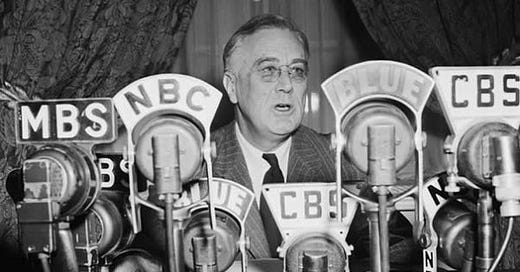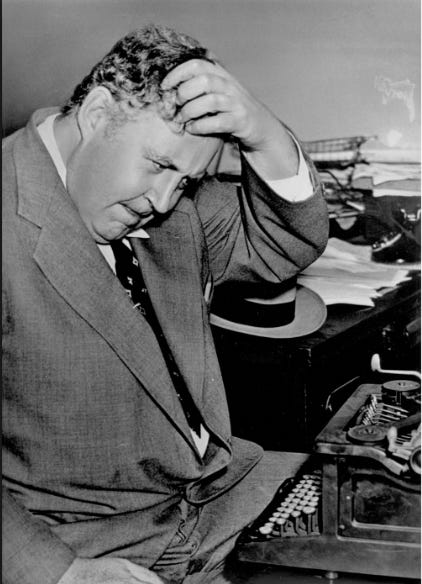As part of his 1938 Christmas address to the nation, on Christmas Eve, President Franklin Roosevelt read the following essay, titled “Even to Judas,” written by journalist Heywood C. Broun just months before Broun, known to be agnostic, was received into the Church. The essay also appeared in the New York World-Telegraph 12/24/38.
We were sitting in a high room above the chapel and although it was Christmas Eve my friend the pastor seemed troubled. That was strange, for he was a man extremely sensitive to the festivities of his faith.
The joys and sorrows of Jesus were not to him events of a remote past, but more current than headlines in the newspapers. At Christmas he seems actually to hear the voice of the herald angels.
He is an old man, but this was the first time the Nativity failed to rouse him to ecstasy. Something was wrong.
“Tomorrow,” he said, “I must go down into that chapel and preach a Christmas sermon. I must speak of peace and good will toward men. I know that our world is one of war and hate. Others keep insisting that before there can be brotherhood there must be the bashing of heads. You are all for good will to men, but you want to note very many exceptions. I am still hoping and praying that in the great love of God, the final seal of interdiction must not be put on even one. You may laugh, but right now I am wondering about how Christmas came to Judas Iscariot.”
It is the habit of my friend, when he is troubled by doubts, to reach for the Book, and he did so. He said, “Will you assist me in a little experiment? I’ll close my eyes and you hold out the Bible to me. I will open it at random and run my fingers down a page. You read me the text which I blindly select.”
I did as he told me and he happened on the 26th chapter of St. Matthew and the 24th verse. I felt sorry for him, for this was not part of the story of the Birth of Christ, but instead an account of the great betrayal.
“Read what it says,” asked the clergyman.
I did: “Then Judas, which betrayed Him, answered and said, ‘Master, is it I?’ He said unto him, ‘Thou hast said’.”
My friend frowned. Then he looked at me -- in triumph.
“My hand is not as steady as it used to be,” he said. “You should have taken the lower part of my finger and not the top. Read the 27th verse. It is not an eighth of an inch away. Read what it says.
And I read, “And He took the cup and gave thanks and gave it to them, saying, ‘Drink ye, all of it’.”
“Mark that!” cried the old man exultantly. “Not even to Judas, the betrayer, was the wine of life denied. I can preach my Christmas sermon now, and my text will be ‘Drink ye all of it.’ Good will toward men means good will to every last one of us.
“Peace on Earth means peace to Pilate, peace to the thieves on the cross, and peace to poor Iscariot.”
I was glad, for he had found Christmas, and I saw by his face that once more he heard the voice of the herald angels.
The following spring, Broun, previously agnostic, was received into the Church - he had asked for and taken instruction from then-Monsignor Fulton Sheen. He died within the year, December 18, 1939 at age 51 of pneumonia. His funeral Mass was celebrated in St. Patrick’s Cathedral with interment at Gate of Heaven Cemetery in Hawthorne, NY.






Heywood Broun (and his wife, well know women’s rights activist and writer Ruth Hale) begat Heywood Hale Broun, who was a distinguished performer, writer and tv sports commentator on CBS for many years.
I don’t believe, however, that the son followed the father’s path Catholicism.
Forgiveness is powerful